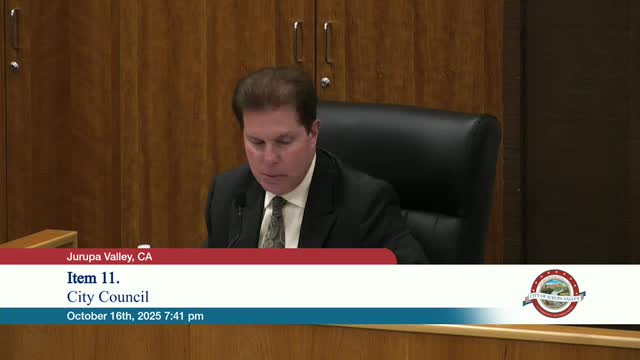Jurupa Valley council forms ad hoc school-safety committee with two school-board trustees
Get AI-powered insights, summaries, and transcripts
Subscribe
Summary
The council agreed to a Brown Act‑compliant ad hoc committee that pairs two council members with two Jurupa Unified School District trustees to assess traffic and safety at school sites and create a shelf‑ready list of projects for grant funding.
The Jurupa Valley City Council voted Oct. 16 to create an ad hoc committee to work with the Jurupa Unified School District on traffic-safety and drop‑off/pick‑up improvements at district school sites.
The school board has already appointed an ad hoc committee — Trustees Pamela Blinn and Raquel Ortiz Cornejo — and the council agreed to appoint two council members to meet with them. At the meeting the council nominated Mayor Bergson and Councilwoman Sanchez as the city’s initial ad hoc representatives; the committee will operate under the Brown Act and hold publicly noticed meetings that the public and other elected officials may attend to observe.
Why it matters: Council members described the effort as a forward-looking inventory of each school site’s traffic conditions to identify low-cost changes (striping, signage, driveway modifications), medium projects and longer-term infrastructure improvements. Having a prioritized, “shelf‑ready” list will improve the city’s chances when applying for grants such as Safe Routes to School and other transportation or traffic‑safety funding.
Scope and process: City staff described an initial approach that will examine each school during drop‑off and pick‑up periods, consult school‑district and city engineering staff and produce a project list with estimated costs and potential funding sources. Because the ad hoc will include members from two separate governing bodies, city staff and the city attorney reminded the council that the ad hoc’s meetings must be publicly noticed and allow public comment; members of the public may observe but council policy limits participation by non‑ad hoc trustees or council members.
Council action: The motion creating the joint ad hoc committee passed unanimously (5–0). The council directed staff to coordinate with the school district, schedule the ad hoc’s first meeting and ensure agendas and meeting notices comply with the Brown Act.
Next steps: Staff will assemble engineering staff from both the city and the district and reach out to principals, teachers and community stakeholders. The ad hoc will report findings and recommended project lists back to the full council and the school board for potential funding and implementation.
Council members emphasized community engagement: teachers, parents and local residents said they want the opportunity to flag specific hazardous crossing points and suggest low‑cost fixes; the ad hoc will provide a public forum for that feedback.
